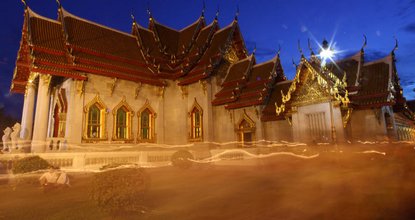
When my teenage daughter, who has never expressed an interest in religion, asked me to take her to a <i>wian tian</i> ceremony to observe Asarnha Bucha Day, I was ecstatic.
You see, we are not a temple-going family, although both my husband and I consider ourselves devout Buddhists. At a time when it is a fashionable for middle-class urbanites to turn to meditation and flock around their chosen gurus, I don't identify myself with what I consider a "groupie" mentality.
Stories of fierce competition among followers to be in their gurus' inner circles have also convinced me to stay away from the "religious community".
In my own individualist path, I meditate on my own, sometimes with YouTube guidance from respectable teachers. I listen to dhamma CDs and read dhamma books for religious contemplation. There are many monks whom I highly respect, but my favourite dhamma book which gives me new insight every time I read it is written by a layperson, not a monk.
In short, I feel I can be a good Buddhist with little direct and personal interaction with monks.
Yet, I felt so happy that my daughter wanted to go to the temple, make merit, and be part of the religious spirit on Asarnha Bucha Day _ the day the Buddha shared what he had learned from his spiritual pursuits and how others could walk his path to extinguish suffering and become awakened themselves.
Finally, my daughter _ without any prodding from her parents _ has chosen to identify herself as a Buddhist. The wian tian ceremony, the walking in a circle around the main temple prayer hall, may be just that _ a ceremony. But it is a physical reconfirmation of faith that will, I hope, open doors for my daughter to the essence of Buddha's teachings later.
When we arrived at the neighbourhood temple, I realised why I could not remember the last time I was there.
Once in the temple, we were immediately assaulted by an assortment of blaring noises from all directions, urging us to donate to the temple's different fund-raising gimmicks.
While I was weary with the noises and the hustle and bustle, almost everybody seemed to have a jolly time cramming to buy flowers, making candles, trying to land their coins on revolving plates of good luck, and elbowing one other to take a picture with a rock star who happened to be at the temple.
With flowers and candles in hands, we were ready for the wian tian walk, but not before my daughter handed me her smartphone, asking me to take her photo. It was a religious occasion. I should not utter negative words, so I kept the scolding about teenagers' obsessions with photo-taking to myself.
It was a crowded wian tian walk on a very hot evening. I tried hard not to bump the red-hot joss sticks on others while the smoke burned my eyes. As my irritations rose, I tried to concentrate on the walking and the breathing. Then I realised that coming to this noisy temple was just the right thing to do.
It's so easy to practise equanimity in a comfortable, quiet atmosphere. It is another thing when we are challenged by the noises, the heat, the smoke, the mosquitoes _ the unhappy reality.
But noises are just noises. So are the heat and the smoke. As with all things, they arise and pass away; so goes the teachings. As Buddhists, we should then face all experiences with equanimity in order to free ourselves of likes and dislikes which are the root causes of suffering.
I was calmed by this realisation. Yet I have a question about equanimity. When temple corruption is the norm, not the exception, is equanimity _ read inaction _ the right approach?
According to research by Assistant Professor Nada Chansom of the National Institute of Development Administration, the country's 37,075 temples receive about 100-120 billion baht in donations annually. The abbots have total control of this tax-free temple money without any monitoring from the Supreme Sangha Council or from the government.
This is a recipe for corruption. If we let this continue, should we blame temple corruption on greedy monks, the government, or ourselves?
My mind was still occupied with this question when we drove home. My daughter was, as usual, busy with her phone as my husband tried to test her knowledge on what the Buddha taught on Asarnha Bucha Day.
"I'm so happy," she said. "My photo at the temple got more than 100 likes."
Is this really why she wanted to go to the temple? I simply didn't know what to say.
Sanitsuda Ekachai is Editorial Pages Editor, Bangkok Post.
